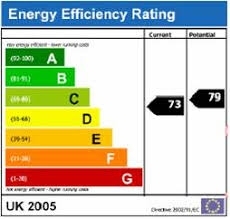Are You Ready for Minimum Energy Efficiency Standards?
- Published: 5th Feb 20
- Category: News
We know. You were just settling back into the year, looking forward to glimpsing the first daffodils and feeling the gentle warmth of the Spring sun weren’t you?
Well allow us to break the spell and remind you of the riveting matter of Minimum Energy Efficiency Standards in the Private Rented Sector and the looming deadline of the 1st April 2020.
Ready? Grab a cup of skinny latte and start reading.
Back in 2008, regulations came into force that meant if you wanted to let or sell a property you were required to commission a report (known as an EPC) that detailed the Energy Efficiency of the property and how that efficiency might be improved. These reports award a grading between A-G, much like you see on a washing machine or fridge these days.
The idea behind this is that a prospective buyer or tenant could see the likely running costs for heating the property.
Time has shown us that most buyers and tenants do not really make their decision based on this but perhaps that will change as Utility Suppliers continue to increase their charges.
Since 2008 there have been a number of changes to the regulations including the Energy Efficiency (Private Rented Property) (England and Wales) Regulations 2015 which introduced requirements for Landlords to have a property that meets the Minimum Energy Efficiency Standards (MEES). This minimum rating is an E or above in order to be able to grant a tenancy on a property.
There are two important dates with these Regulations. The first being the 1st April 2018 after which it would be a breach to grant a new tenancy, including a tenancy that becomes statutory periodic when a current EPC shows a rating of F or below.
The second date is the 1st April 2020 at which point all tenancies running on a current EPC with a rating of F or below will be in breach of MEES. Of course, in practical terms you cannot just remove your tenant as they have a right of possession which is not affected by a Landlord failing to comply. However, allowing the tenancy to run means that the Landlord will be in breach of the regulations. Where there is a current EPC which does not meet MEES the Landlord is required to make improvements to the property or to register an exemption.
Grab another coffee.
The other area of huge confusion is on Grade II listed properties. Look in any Estate Agents window at a Grade II listed Property advert and you will see “EPC exempt” stamped across it. There isn’t actually such an exemption.
The confusion arises though from the regulations which says that EPCs are not required for: “buildings officially protected as part of a designated environment or because of their special architectural or historical merit, in so far as compliance with certain minimum energy performance requirements would unacceptably alter their character or appearance”.
However, unless you have an EPC carried out, you don’t know what areas of the property could not be improved without affecting the listing status. Therefore, an EPC is legally required for those areas of the property not affected by the listing.
For example, if installing loft insulation improves the efficiency then this can be done without affecting the character or appearance, where as installing double glazing would affect the appearance and would not be allowed under the terms of the listing.
Where the certificate expires during a tenancy, you only need to have a new one once those tenants leave and you start marketing the property again. The 2007 Regulations require you to have an EPC on any dwelling that you market for sale or for let. There is nothing in the regulations that requires you to renew an EPC on expiry where there is no change of circumstance to the parties. So, if you reach the 1st April 2020 and your EPC has expired but your tenants remain, you do not need to do anything at that point.
Now you’ve got all that, it is also worth noting that there is a proposed bill that has just received its second reading in the House of Lords that if it comes into force will require all domestic properties to have a minimum energy standard of C by 2035.
And, relax…. We’d be happy to give further guidance on this to any Landlords who may be affected.
Please note the date this article was published as the law may have changed since it was posted. You should always seek independent legal advice if you are intending to rely on any of the contents.
All resources & news